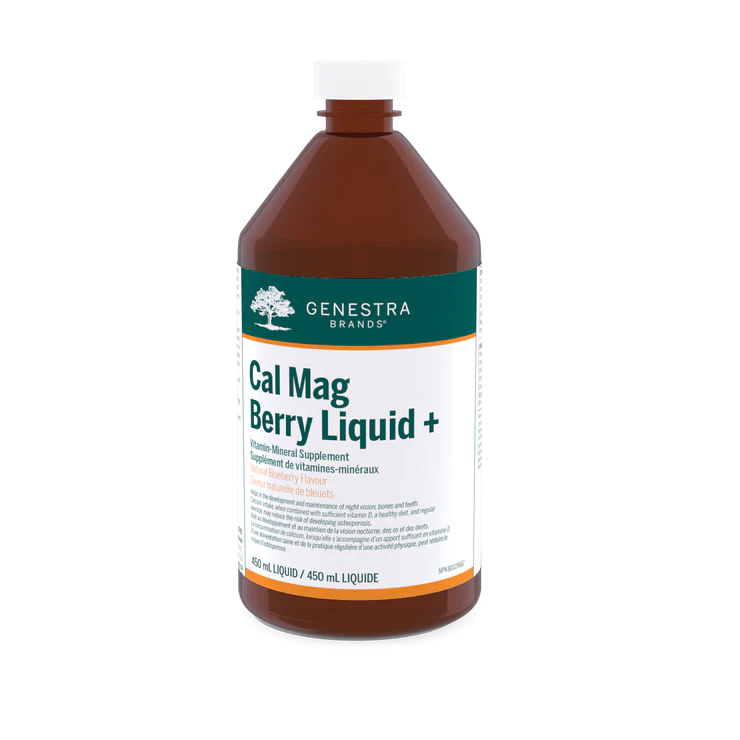Mag Cal Formula 2
Musculoskeletal support formula with magnesium, calcium and vitamin D
• Provides 400 mg of magnesium, 200 mg of calcium, and 100 IU of vitamin D per daily dose
• Helps in the development and maintenance of bones and teeth
• Helps to metabolize carbohydrates, proteins and fats
• Helps to maintain proper muscle function
• Calcium intake, when combined with sufficient vitamin D, a healthy diet, and regular exercise, may reduce the risk of developing osteoporosis
• 90 tablets
Mag Cal Formula 2 supports muscle and bone health using a combination of magnesium, calcium and vitamin D. Each of these active ingredients plays an important role in maintaining optimal muscle function and bone mineral density. Magnesium is a cofactor for the enzyme creatine kinase, which generates ATP from phosphocreatine stored in muscle tissues during intense exercise (known as alactic anaerobic metabolism.) In a double-blind, placebo controlled clinical study conducted on 25 healthy male volleyball players with normal magnesium levels, supplementation with 350 mg of magnesium oxide for 4 weeks supported muscle function associated with intense exercise, by improving alactic anaerobic metabolism. Following supplementation, lactate production during peak exercise was significantly reduced in the magnesium group in comparison with baseline measurements.1
REFERENCES
1. Setaro L et al. Journal of Sports Sciences. 2014; 32(5); 438-445
Musculoskeletal support formula with magnesium, calcium and vitamin D
• Provides 400 mg of magnesium, 200 mg of calcium, and 100 IU of vitamin D per daily dose
• Helps in the development and maintenance of bones and teeth
• Helps to metabolize carbohydrates, proteins and fats
• Helps to maintain proper muscle function
• Calcium intake, when combined with sufficient vitamin D, a healthy diet, and regular exercise, may reduce the risk of developing osteoporosis
• 90 tablets
Mag Cal Formula 2 supports muscle and bone health using a combination of magnesium, calcium and vitamin D. Each of these active ingredients plays an important role in maintaining optimal muscle function and bone mineral density. Magnesium is a cofactor for the enzyme creatine kinase, which generates ATP from phosphocreatine stored in muscle tissues during intense exercise (known as alactic anaerobic metabolism.) In a double-blind, placebo controlled clinical study conducted on 25 healthy male volleyball players with normal magnesium levels, supplementation with 350 mg of magnesium oxide for 4 weeks supported muscle function associated with intense exercise, by improving alactic anaerobic metabolism. Following supplementation, lactate production during peak exercise was significantly reduced in the magnesium group in comparison with baseline measurements.1
REFERENCES
1. Setaro L et al. Journal of Sports Sciences. 2014; 32(5); 438-445
Musculoskeletal support formula with magnesium, calcium and vitamin D
• Provides 400 mg of magnesium, 200 mg of calcium, and 100 IU of vitamin D per daily dose
• Helps in the development and maintenance of bones and teeth
• Helps to metabolize carbohydrates, proteins and fats
• Helps to maintain proper muscle function
• Calcium intake, when combined with sufficient vitamin D, a healthy diet, and regular exercise, may reduce the risk of developing osteoporosis
• 90 tablets
Mag Cal Formula 2 supports muscle and bone health using a combination of magnesium, calcium and vitamin D. Each of these active ingredients plays an important role in maintaining optimal muscle function and bone mineral density. Magnesium is a cofactor for the enzyme creatine kinase, which generates ATP from phosphocreatine stored in muscle tissues during intense exercise (known as alactic anaerobic metabolism.) In a double-blind, placebo controlled clinical study conducted on 25 healthy male volleyball players with normal magnesium levels, supplementation with 350 mg of magnesium oxide for 4 weeks supported muscle function associated with intense exercise, by improving alactic anaerobic metabolism. Following supplementation, lactate production during peak exercise was significantly reduced in the magnesium group in comparison with baseline measurements.1
REFERENCES
1. Setaro L et al. Journal of Sports Sciences. 2014; 32(5); 438-445







